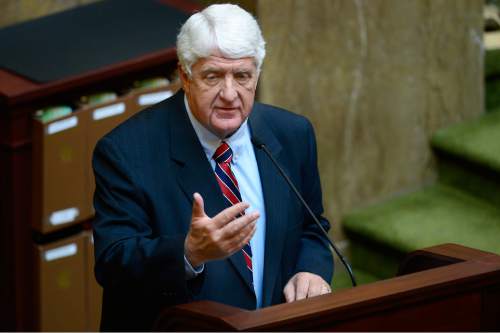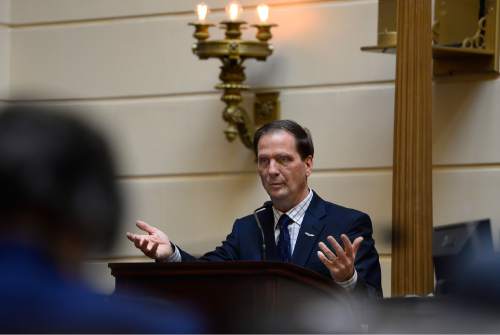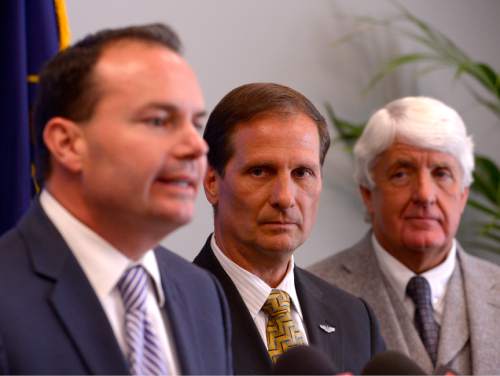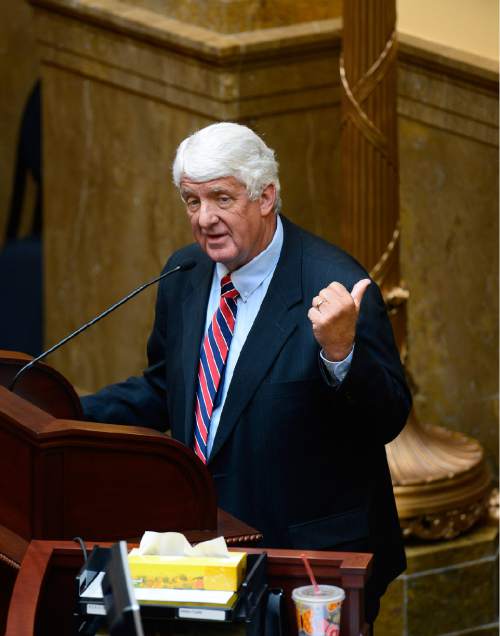This is an archived article that was published on sltrib.com in 2015, and information in the article may be outdated. It is provided only for personal research purposes and may not be reprinted.
Seven years beyond its intended shelf life, the federal No Child Left Behind act is poised for an update after a landslide bipartisan vote in the U.S. House of Representatives.
House members voted 359-64 in favor of the Every Student Succeeds Act, which shrinks the role of the federal government in dictating education policy and returns power to the states to determine how and when to intervene with struggling schools.
The Senate is expected to vote on the bill next week, with bipartisan support, and the Obama administration issued a statement endorsing the proposal Wednesday following the House vote.
But included among the 64 opposing votes on Wednesday were all four of Utah's elected members of the House of Representatives.
In a prepared statement, Rep. Rob Bishop, a former teacher, described the bill as a step in the right direction, but one that preserves too much federal involvement in education.
"It did not go far enough to empower parents and allow local schools to succeed."
Rep. Mia Love agreed, saying in a statement that the bill "started with good intentions, but unfortunately ended with more money and control going to Washington bureaucrats. ... The best education decisions are made at a local level with Utah parents, Utah teachers and local administrators."
Utah Congressman Chris Stewart expressed similar concerns.
"Congress must do more to give states, local communities and parents more control over their children's education," he said.
Enacted in 2002, the No Child Left Behind act made annual testing a requirement in exchange for federal funding.
Schools were required to meet performance thresholds that increased each year, or be labeled failing and subject to sanctions and mandatory corrective measures.
The law called for 100 percent of students to test at grade level by 2014, seen by most educators as an unattainable goal.
As that deadline approached, and without action to update the law by Congress, the Obama administration began offering waivers to states, leading to accusations that the Department of Education had circumvented the legislative process and enticed education leaders around the country to adopt the Common Core State Standards.
Utah's state school board in January called on lawmakers to sponsor or support efforts to resolve the "impossible" mandates of No Child Left Behind.
And State Superintendent Brad Smith sent a letter to the state's federal delegation urging support of the Every Student Succeeds Act.
Under the new bill, annual testing would continue. But states would set performance expectations and the Department of Education would be prohibited from influencing the adoption of statewide standards.
Jon Cox, spokesman for Utah Gov. Gary Herbert, said Thursday that under the new bill, Utah would no longer be at the mercy of the Department of Education.
"Gov. Herbert was pleased that Speaker Paul Ryan and other members of the U.S. House of Representatives voted overwhelmingly in favor of the Every Student Succeeds Act," Cox said.
Less pleased is Christel Swasey, a Utah blogger and grass-roots organizer who encouraged voters to contact Utah's delegation and urge opposition to the bill. She said the Every Student Succeeds Act, the result of a conference committee that reconciled differences between House and Senate proposals, was rushed to a House vote without time for proper study.
"This is what I would call a Frankenstein bill," she said. "Because this is a combination of two ugly things."
Swasey said she was not familiar enough with No Child Left Behind to compare it to the Every Student Succeeds Act.
But the new bill, and the two proposals it stems from, contain too many instances of federal overreach and contradiction for her to support it, she said. "They're just making the states enforce the federal will," she said. "And that is not my definition of local control."
Love said that the bill proposes to "intervene at an even earlier age in our children's lives," a "federal intrusion" that concerns her as a mother.
A spokesman for Sen. Orrin Hath said Thursday that Utah's senior senator will vote in favor of the bill. Hatch served on the conference committee for the Every Student Succeeds Act, and in a prepared statement released after the House vote said the bill empowers states to establish systems that work best for local districts, families and students.
"Without this bill, No Child Left Behind will remain the law of the land, and states will remain subject to the Obama administration's waivers and federal requirements that accompany them," he said.
If the bill is signed into law, as expected, Hatch will be the only member of Utah's federal delegation who supported its passage.
Sen. Mike Lee spoke against the process that created the bill on the Senate floor last month. On Thursday, he told the Tribune that the bill language restricting the Education Department is inadequate.
"As long as the Secretary of Education retains veto authority over a state education plan and as long as that veto authority can be used to deny a substantial portion of each state's elementary and secondary education revenue," he said, "then you've got a major problem."
Utah's Rep. Jason Chaffetz also voted against the bill on Wednesday, but did not respond to the Tribune's request for comment.
In a prepared statement, Love's political opponent, Democrat Doug Owens, accused Love of doubling down on her "reckless education agenda" by voting against the bill.
"I stand with Utah parents, teachers, Governor Herbert, and Senator Hatch in supporting these bipartisan reforms to give states more control over our schools."
—Tribune reporter Matt Canham contributed to this article.
bwood@sltrib.com Twitter: @bjaminwood









